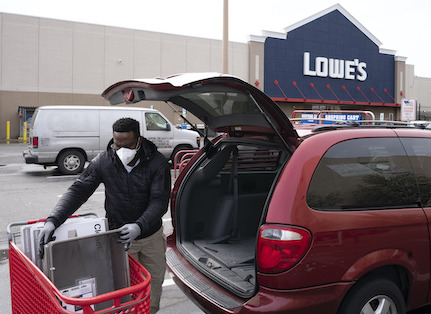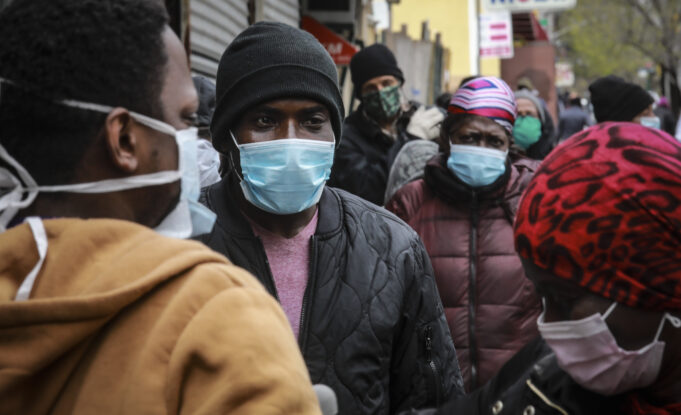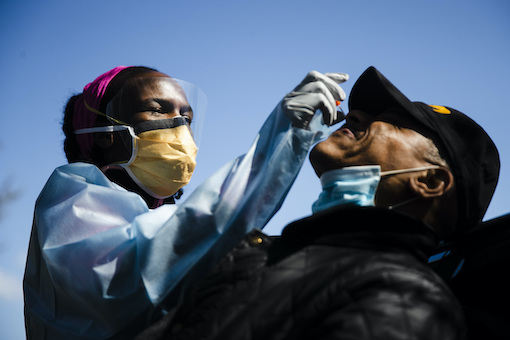True to form, the National Urban League’s 2020 State of Black America Report highlights the plight of Black inequality and economics in America. And, this year’s 44th edition focuses on the Covid-19 global pandemic, racial justice, and imperatives for Black survival.
“America caught the coronavirus and Black America caught hell,” opens “Unmasked,” the benchmark report. It outlines the coronavirus’ impact particularly within the country’s economy, health care institutions, and justice systems through the lens of more than a dozen contributors.
In a bleak snapshot of race-based data compiled in partnership with the Johns Hopkins Center for Health Equity, the report indicates that Blacks, Latinos and the Indigenous are getting sick and dying in higher numbers.

Friday, April 3, 2020, during the coronavirus pandemic
in New York. (AP Photo/Mark Lennihan)
Further, Blacks are reportedly three times as likely to contract the coronavirus and nearly twice as likely to die from COVID-19 as Whites.
The Black death rate from COVID-19 is higher than the Latino rate, even though Latinos are more likely to contract the infection due in part to an older Black population, according to the report.
Further, Black patients have tended to be far sicker when they finally receive treatment, partly because they are less likely to have health insurance, but also because of systemic racism in the health care system that downplays their symptoms, it continued.
“It just puts a marker that these disparities, as we have been saying for years, are frozen into the American economic, political, health and educational systems in America. And so this report defines structural racism,” said Marc Morial, National Urban League president.
“If people want to know what structural racism is, it is the fact that these disparities in the 15 years that we’ve been releasing these statistics, in this fashion have changed very little,” he said during a press tele-conference on Aug. 11.
The findings underscore America’s division along racial fault lines erupting from the Trans-Atlantic Slave Trade, and how those breaks continue through institutions and laws built on racist ideologies that continue to oppress, terrorize and disenfranchise the descendants of the enslaved today, summarizes “Unmasked.”
In the midst of the coronavirus-caused worst economic crisis the United States has suffered since the Great Depression a half century ago, three million infections, and more than 130,000 deaths in the country alone, Blacks bore the brunt of disproportionately large job losses, wrote Dr. Bernard Anderson, National Urban League Economic Advisor and Whitney M. Young Professor of Management at the Wharton School of the University of Pennsylvania in his essay, “Off Track: How COVID-19 Derailed Black Employment.”

According to Dr. Anderson, more jobs were lost in March and April than were created in the nine years of recovery from the Great Recession that occurred between 2007 and 2009.
“In April, Black workers lost 2.9 million jobs, raising their unemployment rate from 6.7% to 16.7%. Their labor participation rate, i.e., those working or seeking a job, declined from its all-time high of 62% to 58.6%,” said Dr. Anderson.
“White workers lost nearly 17 million jobs, with 12 million joining the ranks of the unemployed. Their unemployment rate climbed from 5.4% to 14.2%. The Black/white unemployment ratio fell from its persistent 2:1 level to 1.6, leading some to suggest that the recession acted as an equal opportunity job destroyer,” he continued.
However, he stated, the racial disparity in Black and White unemployment is not clearly revealed just by comparing the data. Black workers are more likely than White workers to drop out of the labor force when unemployment surges. They typically have difficulty finding new jobs, even lower wage work, and many become discouraged and stop looking for work.
“African Americans were not only overrepresented in Covid-19 cases and deaths, but they were disproportionately impacted by the attendant job loss. As our nation reckons, yet again, with its history of anti-Black racism, it is clear that high priority must be placed on targeted policies that eliminate racial inequality in the labor market,” said Dr. Anderson.
State of Black America’s 2020 Equality Index indicates that a calculation of the social and economic status of Blacks relative to Whites, is 73.8 percent. And that’s 78.8 percent for Hispanics, according to the index, which measures Black progress, or the lack thereof, in economics, health, education, social justice, and civic engagement.
Immediate solutions involve a recognition that the public health system in America is broken, doesn’t address the disparities that Covid-19 has exposed, and that monies spent to rebuild the country’s public health systems must be done through an equity lens in a significant way, said Mr. Morial.
“That means that Congress shouldn’t just appropriate money to hospitals. It should create conditions on states, conditions on hospital systems to utilize these resources,” he stated. His second immediate concern is that vulnerable communities are prioritized for Covid-19 vaccines.
“What stands out in 2020 is the awakening that the information contained in this report is real, substantial, and that something has to be done about it … we’ve been releasing this information for years. And all too often mainstream media said well, what’s new? The point is, is that nothing is necessarily new, that the problems remain. They’re persistent, and they continue to effect the nation,” Mr. Morial told The Final Call.
Do not be deterred psychologically by Covid-19 or voter suppression and use the upcoming elections to make change, he continued. “We must go vote. We must fight through. We must battle in every way, shape or form, but I’m saying to people, if you gotta put on a hazmat suit, get hazmat suit and go to the polls,” he said later in the call.
Voter suppression issues are clearly not new, but past efforts, particularly digital, will have a bit more credibility, because of actual changes to how people vote during Covid-19, according to Brett Schafer, media & digital disinformation fellow for the Alliance for Securing Democracy. He co-wrote “The Vote and the Virus: Inoculating the Election From Disease and Disinformation” even before the George Floyd protests that erupted after Minneapolis Police officers killed the Black father on May 25.
“So you’re seeing all of these different kind of opportunities for bad actors, probably mainly domestically, but also foreign, bad actors to exploit some of these many issues,” Mr. Schafer told The Final Call.
The solution involves clear, consistent messaging about how people can vote, making communities aware of those changes, and even a door-knocking campaign, he recommended.
But it’s also incumbent on everyone to avoid spreading false or misleading information accidentally, he added.
For his part, Van Jones, CEO, Reform Alliance and CNN host and political commentator underscored how Covid-19 is “ripping through prison and jails at up to 15 times the infection rate of their surrounding populations.”
“If elected officials don’t act quickly enough, America’s 7,000 jails and prisons could turn into morgues,” wrote Mr. Jones in his essay, “No One Was Sentenced to Die by a Virus: A SAFER B.
Because 40 percent of the 2.4 million people behind bars in the United States are Black, the pandemic in its prisons poses a disproportionate threat to that population, he added.
To save lives and flatten the curve behind bars, REFORM Alliance and the National Urban League recommends, depopulating jails and prisons, stop arresting people for minor or petty crimes, and surging medical and sanitation supplies into correctional facilities.
The silver lining during these dark times is that the pandemic has revealed shared vulnerability and interconnectedness, said Dr. Lisa Cooper, James F. Fried Professor of Medicine and Bloomberg Distinguished Professor in Health Equity at Johns Hopkins University Schools of Medicine.
She detailed how structural inequalities historically reflected in policies and institutions, such as redlined neighborhoods for Blacks, exist as part of the systematic elimination of key social and economic resources for those communities today. They face a lack of access to healthy food, a strong education, gainful employment opportunities, safe physical and social environments, and high quality health care, wrote Dr. Cooper.
Structural inequities link to higher rates of infant mortality among Blacks and Native American babies, higher rates of asthma and obesity among Black children, higher rates of complications and deaths among pregnant women, and earlier onset of multiple chronic conditions such as obesity, hypertension, heart disease, diabetes, and cancers among Black adults, leading to premature death and disability, she noted.
“These same factors are now contributing to an overrepresentation of African Americans among hospitalizations, complications, and deaths from Covid-19,” she stated.
Along with Dr. Josh Sharfstein, vice dean for Public Health Practice at Johns Hopkins Bloomberg School of Public Health, she recommended local and national leaders track and monitor data on racial disparities in the impact of Covid-19; provide better access to testing and medical care; communicate in a trustworthy and respectful manner with communities of color; encourage employers to provide protective equipment and improve working conditions for essential and frontline workers (the majority of whom are people of color); and address the immediate risks these groups face with respect to stable housing, food security, digital access for education, and health care.
Civil rights attorney Benjamin Crump believes 2020 is a seminal year that will mark a turning point in America’s consciousness toward Black Americans and, he hopes and prays, provides the impetus to change longstanding systems plagued by injustice and inequity, he indicates in his essay, “The Pandemic, Police & Protests: Marking a New Chapter in the Story of American Life.”
Study after study has shown that unarmed Black Americans are far more likely to be killed by police than Whites, said Atty. Crump. That’s exacerbated by a new existential threat, Covid-19, which is killing Blacks at an alarming and disproportionate rate, he noted.
“Once Covid-19 mutated with all the normal risks of being Black in America, it gave rise to novel threats. When Black men were stalked by a police officer at a Walmart for wearing surgical masks to prevent the transmission of the coronavirus, we saw once again that the rules are different for our community,” continued Atty. Crump.
“It’s interesting that Covid-19 hit at right around the similar time as when the United States of America, really was grappling with issues of racial inequality, ignited by other incidents but ignited by the George Floyd killing. And so we have this public health crisis that was shutting America down as the reality of racial inequality was kind of sparking consciousness raising all across the country,” concurred Dedrick Asante Muhammad, chief of Race, Wealth and Community for the National Community Reinvestment Coalition.
He doesn’t see the Covid crisis radically subsiding until May 2021, and in order to survive, particularly the climbing unemployment rates, radical changes are crucial, he told The Final Call.
Those able should take advantage of certain aspects, for instance, don’t travel as much, curb eating out as often as before, and focus on saving. He also encouraged paying off debt in preparation for long term shifts in industry and big budget crises in the future at city and state levels. Look for other opportunities, such as part time jobs and entrepreneurial activities online, he added.
“We might have a city or state job and we can work from home and we haven’t lost a paycheck yet, and that’s great. But in a year or two, when cities and states have been going without the tax revenue they’re used to, we might start seeing some cuts there and it’s going to be essential that you have your financial house as in stronger order as possible,” said Mr. Muhammad.














